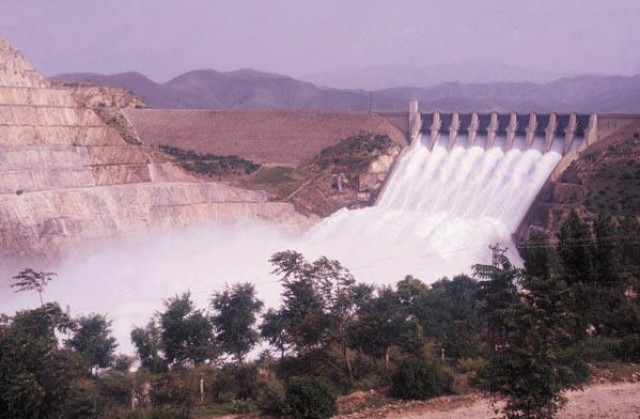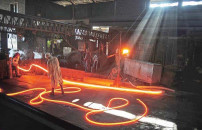Tarbela fourth extension: Project faces delay as only 17% of funds spent so far
World Bank has approved $840 million for the hydropower project

The WB board had approved a mix of concessionary and expensive loans to add 1,410MW to the existing generation capacity of Tarbela hydropower project. PHOTO: AFP
The $914-million Tarbela fourth extension hydropower project, planned to add 1,410 megawatts by 2018, is facing delays as the country could spend only 17% of the contracted loan in the first three years, underscoring the problems at the implementation stage.
The slow pace of work has not only put an additional burden on the exchequer in the shape of millions of dollars that the government is paying to the World Bank (WB) in commitment charges on unspent amounts, but it has also blocked the resources that could have been used in other areas.
The Washington-based lending agency approved $840 million for the project in 2012. But almost three years after the work began, the disbursements have amounted to only $143.5 million, or just 17% of the total, reveal documents of the Economic Affairs Division.
The actual spending is even less than the disbursement. The WB released the latest tranche of $23.1 million in December.
The slowdown is threatening the timely completion of the project, which is due in 2018, three and half years down the line.
The WB board had approved a mix of concessionary and expensive loans to add 1,410MW to the existing generation capacity of Tarbela hydropower project. After completion, Tarbela’s generation capacity will increase to 4,888MW.
The bank gave $440 million out of its concessionary lending arm – International Development Association. The remaining $400 million came from the International Bank for Reconstruction and Development that carries higher interest rates.
Other cases
Officials of the Economic Affairs Division (EAD) said that the unspent amount for the Tarbela project was not the only case where the government was paying millions of dollars in commitment charges. In the power sector, almost $3 billion in loans extended by the WB and Asian Development Bank had remained unutilised, blocking the precious resources besides putting extra burden on the exchequer.
The WB-funded Natural Gas Efficiency project worth $100 million is another troubled project. The project was approved in 2012 and disbursements to date stood at only $300,000.
Not as bad as it looks
The EAD’s indicative disbursement chart shows zero releases by the WB against the Tarbela fourth project in the next three years. However, the Water and Power Development Authority (Wapda) officials insist that things are not as bad as they look on paper.
The WB has recently approved an accelerated implementation programme to fast track work on the project and the extension phase will be completed in 2017, a year ahead of the original plan, claimed Zafar Mehmood, Chairman of Wapda, while talking to The Express Tribune.
At the time of approval, the project had won strong support from the directors of the WB. They had termed it a low hanging fruit for Pakistan that would help shift the energy mix away from imported fuel oil for thermal generation to low-carbon, least-cost renewable hydropower generation.
However, the directors had particularly encouraged focus on efficiency and transparency in procurement and financial management, promoting good governance as well as careful implementation of the Social Action Plan to deal with outstanding resettlement issues.
The directors urged close monitoring, given the range of risks facing the project’s implementation – an advice that probably fell on deaf ears.
The Express Tribune contacted the local office of the WB and sought its response and the needed corrective measures to put the project back on track. However, the official spokesperson gave a terse response, saying “all contracts have been awarded and are now being executed”.
Despite delays in the award of the contracts and actual work on the ground, the latest report of the WB has awarded the project a ‘satisfactory’ rating.
Published in The Express Tribune, February 8th, 2015.
Like Business on Facebook, follow @TribuneBiz on Twitter to stay informed and join in the conversation.



















COMMENTS
Comments are moderated and generally will be posted if they are on-topic and not abusive.
For more information, please see our Comments FAQ